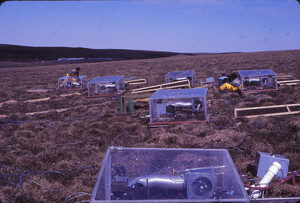Computers and the internet changed many aspects of scientific research and also how scientists could communicate with each other. Advancements in computing have not altered all aspects of ecosystems ecology research, but they have allowed more continuous and rapid collection and processing of data. Similarly, many of the mathematical models developed to predict ecosystem processes could be done without advanced computing, but computers have allowed scientists to test mathematical models much faster than in the past. According to researchers at the Ecosystems Center, one of the major changes in research came with the move to electronic spreadsheets. Researchers use spreadsheets to record, analyze, and store large datasets. Also, as computers became smaller, researchers could start leaving them on-location with field experiments. This was useful because these computers could make continuous observations and transmit the data to other computers, where it could be quickly accessed and shared.
As of 1990, none of the seventeen Long Term Ecological Research (LTER) field sites, which involved many Ecosystems Center researchers, had an internet connection. The Arctic Tundra LTER field site, led by Ecosystems Center scientists, did not even have a phone connection. Addressing this lack of connectivity, the US National Science Foundation (NSF) helped promote technological advancements in projects that they funded. NSF realized the importance of networking between researchers and created the NSFNET in 1985. NSFNET linked the computers of NSF-funded scientists in the US, and laid the infrastructure for the internet. The NSF also allocated specific fund for new technologies in the Long Term Ecological Research projects. As the internet became mainstream, it had many advantages for scientists. Scientists could more easily and quickly communicate research and ideas, as well as electronic datasets that were difficult to transfer to paper.
Stable Isotope Research
- Peterson et al. 1985
- Peterson and Frye, 1987
- http://www.uwyo.edu/sif/stable-isotopes/index.html
Computers and the Internet
- LTER Report: Internet and LTERs 1990
- LTER Report: Tech development LTERs 1991
- NSF Report http://www.nsfnet-legacy.org/about.php
Microbiology and Molecular Biology
- Hobbie et al. 1977
Historical Contet of Climate Change Research
- Canadell et al. 1999
Global Carbon Cycle Project
- Houton et al. 1983
- Moore et al. 1981
- Rastetter and Shaver 1992
Processed-based Models TEM and GEM
- Melillo et al. 1993
- Raich et al. 1991
- Rastetter et al. 1991
Long-term Ecological Research at the EC Historical Context
- Hagan 1992, An Entangled Bank
- Hobbie et al., 2006
Arctic Long Term Ecological Research: Toolik Lake, Alaska
- Chris Neill. https://www.youtube.com/watch?feature=player_embed...
- Hobbie and Kling, Eds, 2014, Alaska's Changing Arctic: Ecological Consequences for Tundra, Streams, and Lakes
- 1987 LTER NSF proposal
- 1998 LTER NSF proposal
- 2010 LTER NSF prososal
- http://arc-lter.ecosystems.mbl.edu/
Forest Long Term Ecological Research: Harvard Forest, Massachusetts
- http://science.energy.gov/ber/highlights/2013/ber-...
- Frey et al. 2013
- LTER 1 grant, 1988 http://harvardforest.fas.harvard.edu/sites/harvard...
- Melillo et al. 2002
Coastal Long Term Ecological Research: Plum Island Sound, Massachusetts
- Hayden et al. 1996 http://atlantic.evsc.virginia.edu/~bph/LTER_LMER/w...
- NSF LTER proposal 1998
- NSF LTER proposal 2002
- Valiela, 1995. Marine Ecological Processes.
- VIMS, Nutrient cycling: http://web.vims.edu/bio/shallowwater/ecosystem_pro...
Ocean Flux Program
- MBL. ND. "Ocean Flux Program." Ecosystems Center a the MBL. http://www.mbl.edu/ecosystems/conte/ofp/
- Chapin III, Stuart F., Pamela A. Matson, Peter M. Vitousek. 2012. Principles of Terrestrial Ecosystem Ecology. Springer: New York.
- Conte, Maureen. 2014. "Particle Flux in the Deep Sargasso Sea The 35-Year Oceanic Flux Program Time Series." The Official Magazine of the Oceanography Society Oceanorgraphy. 27(1). http://tos.org/oceanography/assets/docs/27-1_conte...
Semester in Environmental Science Program
- The Ecosystems Center Report 2015-2016
- MBL. ND. "Student Projects." Ecosystems Center a the MBL. http://www.mbl.edu/ses/courses/projects/
- MBL. ND. "Semester in Enviromental Science." Ecosystems Center a the MBL. http://www.mbl.edu/ses/

